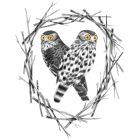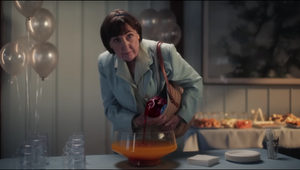
‘We Can’t Think We Have Done Enough or That the Movement Is Over. It Will Never Be Over.’

The entire advertising industry has been pushed in recent months to address diversity within agencies. But in a bid to encourage agencies to be committed to top-to-bottom diversity with partners too - from directors to musicians to post-production and beyond - US sound studio Barking Owl, along with production partner UNIT9, has launched ‘Barking Owl Sessions’, a weekly series that broadcasts intimate performances from up-and-coming Black artists on Instagram Live.
The goal of the initiative is to showcase Black artists to brands, agencies, creatives and producers who may want to license their music for commercials. Recent performances include rappers Problem (who’s written for Snoop Dogg) and Jodie Jo (who had never performed outside of his bedroom before the session), songwriting duo Campfire feat. Sean Eli, R&B singer Alex Isley and many others.
“The foundations of Barking Owl Sessions really lives within our belief that true equality is achieved through economic empowerment,” says Kelly Bayett, founder and creative director of Barking Owl. “Real change can happen when we view racial equality, eradicating poverty and inclusive economic growth. I have access to clients, licensors, brands and creatives who can help create an economy for these artists. Why wouldn't I use that platform to create an opportunity for someone else? I wanted to create a community among the artists and it's been really fantastic to watch. They all support and help each other.”
Kelly was inspired to launch an initiative like this after seeing a lot of social posts around diversity but little action. She’s a believer that even the smallest-scale help counts in the domino effect of changing one person’s perception of something. Looking at the industry in which Barking Owl operates, Kelly saw an opportunity to lift the voices of independent Black artists to licensors, marketers, creatives and brands to help not only with exposure but also to help the artists be considered for brand partnerships.
“Black people make huge contributions to the nation's economy, to what we love culturally and, let’s be real, all modern music stems from Black music,” she says. “Our society wants to celebrate and even appropriate the culture but doesn't want to pay Black people what they are worth. Even worse than that, they are not treated equally or with respect. If we celebrate the culture, we must also celebrate, honour and cherish the people who are creating it. My hope is that they can see, value and appreciate the artists. And then, I hope partners hit them up and give them lots of money!”
All of the performances live on a dedicated YouTube channel that serves as a library where people can access previous sessions at any time. To get an artist involved it’s a simple case of reaching out to people that they are fans of and follow. Artists are generally always interested because they are so itching to perform again. What’s more, the resulting content is beautiful and the audience is people that could help you make money. Artists are also given the content with no strings attached. Some have already found ways to monetise it and the audio recordings. “The buck always stops at the agents, managers and labels,” she adds. “They are continually stepping over a dollar to grab a dime. It's unfortunate.”
From a production standpoint, all Covid restrictions are being taken into account from both Barking Owl and production partners UNIT9. Michelle Craig, creative partner at UNIT9, couldn’t be more enthusiastic about the team's approach to making the project both safe and beautiful. “There was never a doubt I wanted to be involved. UNIT9 has always prided itself on creating opportunity, and this was an incredible extension of that,” she says. “We've managed to rig a live set up that uses a phone, we've hacked to bring a better visual quality. Our biggest worry going in was the sound quality. We've all seen live sessions where the sound doesn't do the work justice. UNIT9 and Barking Owl collaborated to bring a fully live mixed experience to the stream using a mix of off the shelf technology. Which if you've heard the sessions is amazing!”
Speaking more broadly to the issue of top-to-bottom diversity, Michelle recalls a screening where agency representatives were calling out Barking Owl’s reps for a lack of women represented on their roster. It was a fair argument, she says, but the reps brought up the fact that Barking Owl is woman-owned and run, and has a diverse roster of staff from senior to junior level. “The same people who were giving our reps a hard time felt that in a music and sound company those were not important qualities,” she says. “They cared about the directors. People have this perception that diversity only matters at the top but that couldn't be more wrong.
“We need to have diversity throughout our crews and post production teams as well. We should have diversity amongst PAs and assistants. How are people going to grow into bigger roles if they don't get that first opportunity? They need to not only be hired at all levels, they need to be nurtured and mentored in a safe space. What makes music and art interesting is different points of view. How are you going to get that if everyone comes from the same socio-economic background? Sounds pretty boring to me.”
Kelly has prioritised diversity since she opened Barking Owl 10 years ago. Her team is 73% POC and LGBTQ+, and she is committed to training talent who might not have otherwise had the opportunity to break into the white male-orientated music and ad industries. Earlier in her career she would find herself on the phone with clients and bringing in a male assistant just so the client could hear a man’s voice. “At the time I didn't really care, I just wanted to get the job done, but when we opened Barking Owl I vowed that I would never do that again. That my voice would have to be enough.”
What’s more, Kelly’s own path into advertising wasn’t at all traditional. She didn’t go to college and waited tables. “I know what that hustle looks like when you are trying to survive, get ahead and no one will even respond to you because you don’t have a four-year degree,” she says. “I remember wishing people would at least let me in for an interview because if I could just get in front of them, they would see how hard I would work but I never got that opportunity, so I was a personal assistant for a copywriter and eventually, I found my way into music. I would hire a waitress over a Harvard graduate any day.”
At Barking Owl people primarily start at the client service / assistant level and then move up from there. The entire production team is made up of women who started in client services - a job that is “pretty thankless” in Kelly’s eyes - and excelled from there. “Fantastic with people, uncompromising and with an incredible eye for detail,” she says. “Not everyone is amazing right away, but you can see potential and good people are worth investing your time and money into.”
Kelly hopes that while businesses within the ad industry hopefully diversify their hiring pool, they go deeper than that and ensure any BIPOC people feel comfortable and welcome within a company. “Microracisms are a real thing,” she says. “They are so damaging and it runs rampant in the advertising community. While you are hiring BIPOC, keep in mind that you must create a welcoming and enriching community, or the move doesn't matter. Look at your staff and freelancers. Where is the diversity?”
Kelly noticed that Barking Owl had some holes in its composing pool last year. She admits that they didn’t have enough artists of colour. She made it her mission to change that and they are adding people to the roster all the time. She wants to do better than the 13% representation. Barking Owl is always looking to do and be better but she hopes for similar industry-wide action.
“I do think that genuine change is in the cards,” she says, hopefully. “But I think that everyone needs to know this is a long and hard battle and it will never be easy. We need to be constantly thoughtful. We can't get lazy, think we have done enough or that the movement is over. It will never be over.”
Photo credit: Silvestre Leon on Unsplash.













